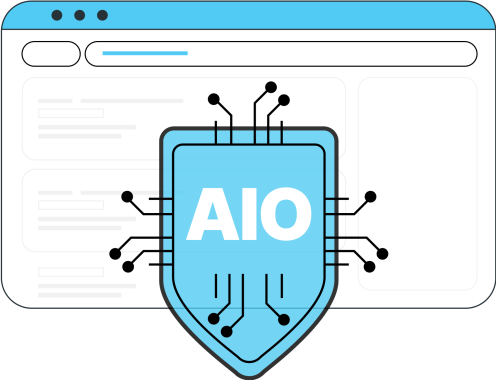At the end of 2022, the public launch of ChatGPT acted as a wake-up call: users were astonished to discover the capabilities of this AI-powered chatbot. However, companies did not wait for OpenAI’s unveiling to embrace artificial intelligence. For several years, the professional world has been keeping a close eye on the technical evolutions associated with ‘thinking machines’. All areas are affected, including SEO, whose processes are gradually being transformed, fuelled by artificial intelligence. To such an extent that we are seeing the emergence of a brand new discipline: Artificial Intelligence Optimisation (AIO), a perfect blend of ‘traditional’ SEO and AI, and a real game changer for the SEO ecosystem. Let’s take a closer look.
The New Reality of Artificial Intelligence (and its Rapid Adoption in Companies)
It’s a phenomenon that might almost go unnoticed: the business world is gradually yet decisively undergoing a transformation, adopting a layer of artificial intelligence. According to a study conducted by Intelligence Unit and The Economist, the pace of adoption of AI-based applications is accelerating in the United States: 75% of executives from 200 North American companies plan to ‘actively implement’ AI in their organisation, and 3% of them have already widely deployed this technology.
The entire world is affected by this rather hasty evolution. The IBM Global AI Adoption annual report makes it clear: in 2022, more than a third of organisations claim to have integrated artificial intelligence into their business in one way or another (+ 4 points compared to the previous year), with 42% investigating its potential. One of the reasons for this change of pace lies in the increased accessibility of AI tools, which are becoming easier to implement in existing systems (with lower integration costs and greater adherence from end users). Taking a look at the graph below, we can see that this trend is verified all over the planet – with a significantly higher adoption rate in China and India, the two most advanced countries in terms of AI.
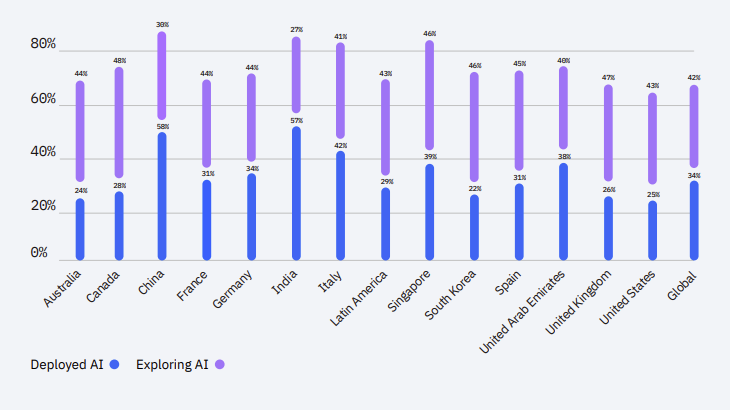
(Source: IBM Global AI Adoption Index 2022)
Companies are guided by the desire to benefit from the advantages of AI, particularly those related to process improvement. In doing so, automating recurrent and repetitive tasks, as well as reducing costs, constitute the two major motivating factors: 30% of IT managers declare that within their organisation, employees are already saving valuable time thanks to automation applications. However, many other benefits should also be considered: skill development, enhancement of recruitment processes, the ability to create low-code or no-code applications (thereby bridging the skills gap that, until now, has limited companies’ ability to develop their own internal business tools), and so on.
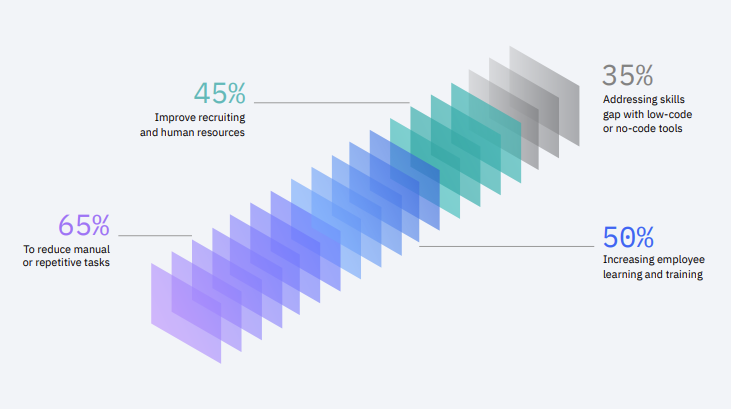
(Source: IBM Global AI Adoption Index 2022)
It is important to understand that this pace of adoption is unparalleled: no other emerging technology has generated so much enthusiasm, nor has it disrupted working methods to this extent. The fact that ChatGPT surpassed the 100 million user mark faster than any other application (in two months) proves how much AI captivates the masses.
Digital Marketing: A Particularly ‘AI-Compatible’ Field
It is in marketing that this evolution is most felt. Because AI has a peculiarity: unlike ‘classic’ automation, which tends to affect more ‘manual’ jobs, artificial intelligence tends to transform creative and intellectual activities. Therefore, it is the roles of web developer, graphic designer, journalist, or data analyst (among others) that are primarily affected this time. The most pessimistic even evoke an upcoming ‘great replacement’, namely the (brutal) disappearance of a large number of professions. But the reality is quite different, as can be seen in the field of marketing: here, AI is more of an ally than an enemy, given all the advantages it brings.
A study conducted by HubSpot reflects this new reality: 70% of marketers explain that generative AI (the branch of this technology that focuses on creating resources) is now essential to their content strategy, while 45% of them are already using artificial intelligence to effectively produce all kinds of content, particularly with the aim of offering a better user experience and improving their visibility on the web. This is, moreover, the most common use of AI in marketing, as shown in this graph:
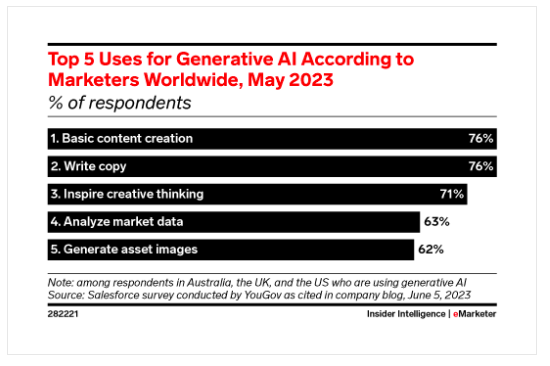
(Source: eMarketer)
AI and SEO: A (Very) Dynamic Duo
This brings us to the use of AI in the field of SEO, and indirectly, to the advent of AIO. Because, it must be pointed out, SEO is one of the disciplines most impacted by artificial intelligence, due to the possibility offered by generative AI to massively produce optimised content. In this respect, 58% of marketers plan to use this technology for their SEO content creation approach in 2023 (BrightEdge study cited by Search Engine Land). This is all the more important as 90% of organisations have prioritised SEO strategies in 2023, and these are fuelled by content that must be produced in large quantities.
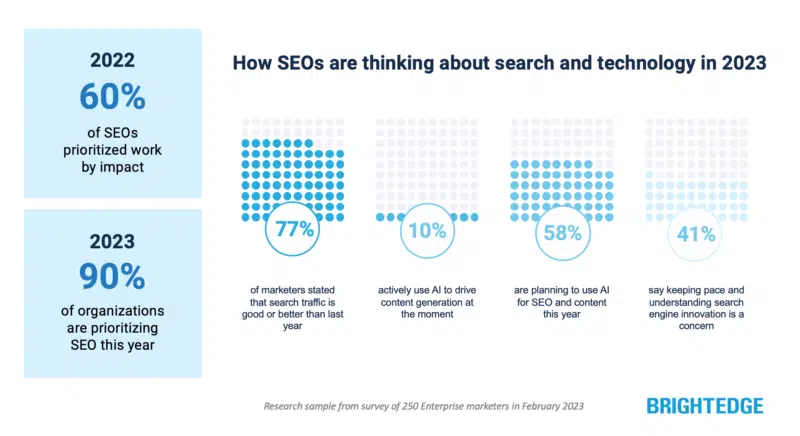
(Source: BrightEdge)
In fact, the use of artificial intelligence in content creation processes is experiencing an inexorable evolution. A survey conducted by an American publisher of SEO tools shows that the adoption of AI-based solutions is exploding among marketers. Between January and June 2023, the number of professionals who say they have incorporated ChatGPT into their daily SEO routine has increased from 29.5% to 54.5%!
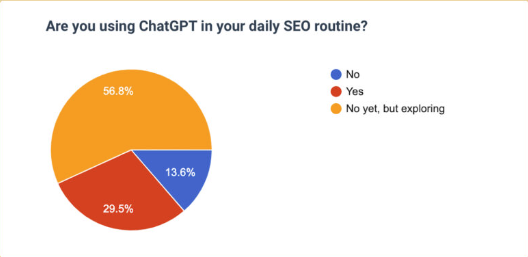
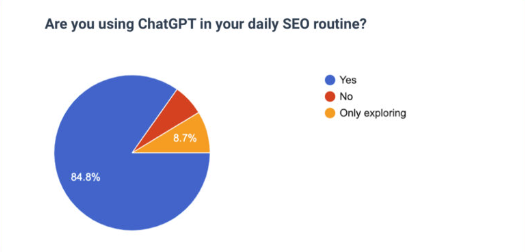
(Source: Thruuu)
If SEO and AI seem to form such a dynamic duo, it’s first because they complement each other in various ways. Beyond content creation (which remains an essential lever of the discipline), AI-powered tools allow companies and SEO experts to transform their way of working…
- by automating recurring and low value-added tasks,
- by producing extremely precise analyses from a large amount of data,
- by providing personalised recommendations,
- etc.
These new tools are so well anchored in the SEO landscape, and bring so many benefits, that a new discipline is emerging that results from the combination of technology and traditional SEO methods: Artificial Intelligence Optimisation (AIO), or ‘AI-powered optimisation’. A type of SEO that relies on AI to optimise its processes.
Artificial Intelligence Optimisation (AIO), or the Natural Evolution of SEO
Clearly, AIO should be seen not as a temporary disruption in the balance of SEO, but rather as a natural evolution of SEO practices. The opening of a new branch of SEO reflects how professionals are integrating AI technology to transform their processes, for the benefit of companies and end users alike: it’s a gradual, and almost inexorable, shift that is taking place. A shift that, fundamentally, does not change the ‘historical’ way of doing things but requires SEO experts to adapt their roles and embrace new possibilities.
For instance? Content creation is arguably the most obvious example, being an area already significantly influenced by the rise of generative AI, especially since the advent of ChatGPT and its ability to generate text with just a few clicks. In companies’ marketing departments, the tool has already become commonplace. However, it’s within SEO agencies that the most significant changes are being felt. Thanks to AIO, professionals are able to produce content that is increasingly aligned with audience intentions, but also perfectly optimised for search engines and, as a result, capable of dominating the best positions in the SERP.
Additionally, by analysing user behaviour, AI can identify the best performing content for a given target, the content that is most likely to be recognised as relevant by both Internet users and search engines. When you know that Google encourages writing content primarily for users (rather than for web crawlers), the usefulness of AI then becomes indisputable.
Keyword research is also integrated into AIO. Artificial intelligence helps SEO experts identify the exact terms used by Internet users to perform a search, better understand their intentions (via advanced semantic analysis that takes into account synonyms and co-occurrences), and identify search trends. AI tools then draw up a list of suggested terms to work on to generate traffic, also taking into account the performance achieved by competitors.
Other areas of SEO are set to be transformed with AI. Thus, voice search – the perennially anticipated yet never fully realised aspect of SEO – might at last gain traction, owing to applications that are more adept at comprehending natural language and providing more pertinent responses to user inquiries. On the other hand, visual search could gain prominence: AI is capable of analysing the content of a photograph and recognising its components, for instance, to enable a user to find a product online. In terms of AIO, SEO experts will use this technology to help their clients optimise their images via the integration of appropriate metadata.
The Importance of Predictive Analysis in SEO
However, the major component of Artificial Intelligence Optimisation is predictive analysis: here lies the complete unfolding of its potential. Indeed, with AIO, SEO experts are able to make extremely precise predictions about future events and upcoming trends, in terms of digital search as well as consumption, based on advanced analyses. It becomes possible to anticipate changes in behaviour, and for example to predict a major increase in traffic on an e-commerce site during a given period of the year, or the sudden interest of the public for a specific product or service. This information is crucial when it comes to highlighting content, a product page, or a brand – and, above all, doing so at the right time.
Through predictive analysis, it also becomes conceivable to presume future algorithmic evolutions of search engines – to predict, for example, an update giving priority to certain types of content. In this sense, the power of AIO is potentially infinite.
AI or the Pillar of Personalisation
Finally, another dimension of AIO should not be overlooked: the personalisation of the search experience. Over the years, search engines have been transforming the rendering of their results page (SERP) to respond ever more effectively to the needs of Internet users. At Google, this evolution is marked by numerous milestones: development of rich snippets, Position Zero, Answer Box, displaying a table or video, organisation or personality box, product listing from Shopping… Everything is designed so that the user immediately gets their answer and no longer needs to click.
But the integration of AI is changing the game even further. On the one hand, by virtue of the Search Generative Experience (SGE), Google is now able to generate a complete answer from its vast index, and thus satisfy the user without them feeling the need to go further. Crafted by AI in real time, the response is displayed in a dedicated banner, accompanied by a few carefully selected sources. On the other hand, in the near future, technology will make it possible to push the personalisation of the SERP to the limit, by offering Internet users results based on their search history and past behaviour. For example, if a user frequently searches for products manufactured by a certain brand, the engine could give priority to results that match that brand, thus trying to anticipate their expectations.
For SEO experts, AIO constitutes a concrete means to adapt to this progressive transformation of the SERP. AI is able to both analyse the functioning of the algorithm and predict changes in a user’s behaviour, and consequently, provide a list of recommendations to apply to produce content capable of satisfying the search engine while meeting the specific expectations of the Internet user. In this context, predictive analysis becomes essential, just like the generation of perfectly optimised content.
There’s a single constant in the digital ecosystem: perpetual change. But some changes are more significant than others, and AI is undoubtedly one of the most profound transformations this field has experienced. SEO experts must take note of this evolution and start now to adapt their methodology, processes and tools, by embracing this new branch of their discipline that is Artificial Intelligence Optimisation. SEO is more vibrant now than ever before, as it slowly evolves into AIO.









